Baseball’s First World Series Goat: Abner Dalrymple and Game Six of the 1886 World Series
April 6, 2009 by Dennis Pajot · 1 Comment
Almost one hundred years to the day before Bill Buckner’s error in game six of the 1986 World Series—forever blaming him for losing the series in some people’s mind, even though another game was played—a similar incident happened to Chicago’s Abner Dalrymple.
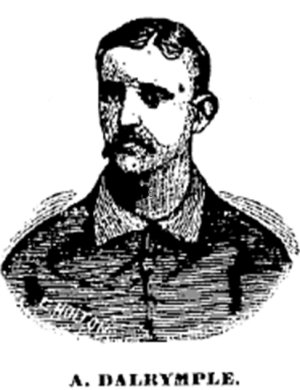
The following is taken from the December 31, 1898, Sporting News , remembering the series and game:
The 10,000 St. Louisans that were lucky enough to get into old Sportsmen’s Park that afternoon will never forget the event. It was the greatest thing in a base ball way that ever happened in this burg.
Comiskey’s Browns had won the championship of the American Association. Anson’s White Stockings were the League pennant winners. The clubs had played a world’s championship series. Chicago had won two games, St. Louis three. On that eventful Saturday the teams came together for the last time. If St. Louis lost the series would have been tied, as it was the year previous with Chicago, and the year before that again with New York.
Despite the encouragement of the crowd the score was 3 to 0 against the Browns until the eighth inning. At this stage Comiskey opened with a safe hit to right. Old Curt Welch made one of his famous bunts toward third and easily beat the ball to first. Tom Burns, now the manager of the Chicagos, made an unnecessary throw to first. The ball went wild, and so did the spectators when they saw Comiskey tearing for home. He made the plate and Welch reached second. The game was stopped for several minutes until the pandemonium eased up. Foutz and Robison flew out. Then Doc Bushong got his base on balls.
Then Latham came to the bat. Arlie had been unusually quiet during the game. Old “Uncle Anse” had picked him out for a mark, and when the Browns were in the field stationed himself near third base and kept up a running fire of “Here’s the soft spot!†“Knock it this way!” “Here’s our puddin.†Arlie made no reply. When he stepped to the plate he opened his mouth for the first time during the game, and what he said was: “Wait there, Doc, and I’ll bring you both in.â€
“Yes, you will,†yelled Anson. “I see you making a home run right now.â€
Mike Kelly raised a laugh by showing Umpire Pearce that Latham was using a flat bat. A new stick was substituted and Arlie began dancing around the rubber.
The first ball John Clarkson pitched was low and straight. Latham cracked it on the nose and it sailed far and high into left field. Had Dalrymple caught it the game was won. But “Dal” failed. He misjudged the ball and Welch and Bushong scored. There was another pause for enthusiasm, for Dalrymple’s error had tied the score.
Both teams were whitewashed in the ninth, and Chicago met the same fate in the tenth. Welch opened for St. Louis with a single. Foutz got in a single. “Robbie” advanced them with a bunt and the runners were on second and third. As Doc Bushong walked to the plate Mike Kelly knelt and presented him with the bat. Then the king spread his legs wide, anchored himself firmly and signaled Clarkson for a low inshoot.
Clarkson delivered the ball, but it was a high rising outcurve. Kelly’s legs were anchored down so far that he could not rise to get it and he laughed as the ball sailed by over his head. Some where along the third base line a cloud of dust arose and shortly the crowd saw Welch slide full length across the home plate with the winning run. In his anxiety he had started to slide while half way from third.
It was a great game of base ball, the like of which has not been seen here in St. Louis in over a decade, but Dalrymple’s error lost it for Chicago and made the St. Louis Browns world champions.
While the Chicagos were leaving the field Anson said to his left fielder, “You can’t play ball for me any more, Dal,†and he was as good as his word. The old man never forgot that costly error, and Dalrymple’s base ball degeneration dated from that day. 1
*Â Â Â Â Â Â Â Â Â *Â Â Â Â Â Â Â Â *Â Â Â Â Â Â Â Â *Â Â Â Â Â Â *Â Â Â Â Â Â Â *Â Â Â Â Â Â Â *
Let us now go back to October 1886 for what had happened.
The National League champion Chicago White Stocking owner Albert Spalding and the American Association champion St. Louis Brown’s Chris von der Ahe settled on a postseason championship series of six games (seven if a tie series after six). “The club winning the greater number of games out of the series played shall be entitled, and shall receive the total gross gate receipts, including the grand stand receipts” from the games, after some expenses were taken out. 2
The first five games resulted in a three game to two game lead for the Browns.
| Monday, October 18 | Chicago | 6 | St. Louis | 0 | ||
| Tuesday, October 19 | St. Louis | 12 | Chicago | 0 | ||
| Wednesday, October 20 | Chicago | 11 | St. Louis | 4 | ||
| Thursday, October 21 | St. Louis | 8 | Chicago | 5 | ||
| Friday, October 22 | St. Louis | 10 | Chicago | 8 | 3 |
There was talk of hippodroming by both teams to make certain the series lasted seven games, to bring in more money. This was denied all around. Spalding said the talk “is based on such ignorance of human nature that I can scarcely bring myself to dignify it with a set contradiction. But I distinctly avow again that there is not a word of truth in it.†4
Game 6 started on Saturday, October 23, at 2:30 p.m. sharp—earlier than usual so the game would not be called by darkness—at Sportsman’s Park in St. Louis. Despite threatening clouds overhead, a large crowd attended the game, occupying all the seats and encroaching onto the field. 5 Betting on the game started with Chicago $100, St. Louis $80. 6
Chicago scored single runs in the 2nd and 4th innings to take a 2 to 0 lead. Sensing a defeat, the home crowd began to grow disorderly prior to the fifth inning. According to the Chicago Tribune : “They felt something must be done, so a light sprinkling of rain was seized upon as a pretext, and several thousand men jumped on the field and demanded the game be declared off. The players were surrounded, the umpire threatened, and time was called. The police then formed in line and drove the crowd back. Play was then resumed.†In the 6th inning Chicago scored another run, while St. Louis continued with zeros. 7
The following description of the later innings is taken from the Sporting News of the October 30, 1886 edition. In the 8th inning, as reported above, Charlie Comiskey singled. Curt Welch then bunted toward third, and easily beat the bunt out. However, Chicago’s Tom Burns made “an unnecessary throw to first, and the ball went wild.†Comiskey scored and Welch advanced to second. After two batters were retired on fly balls, Doc Bushong was walked. The Browns now had runners on first and third, with two outs.
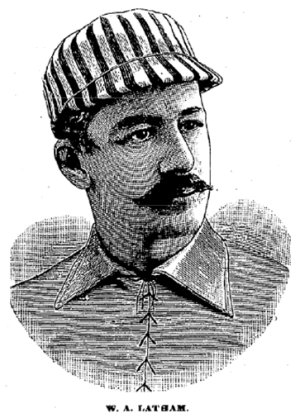
Arlie Latham then tripled over Dalrymple’s head in left field, driving in two runs. According to the Sporting News , “Dalrymple made a very bad attempt to judge the ball, but it is doubtful if he could have reached it.” The score was now tied, still with two outs. Bob Caruthers ended the inning by grounding to third.
In the 9th inning Burns doubled with one out and went to third on a ground out. Dalrymple had a chance to redeem himself, but struck out for the third out. The Browns went down one-two-three in the bottom of the ninth. The White Stockings were retired quickly in the tenth, setting the stage for the winning Brown’s run in the bottom of that inning. Curt Welch led off and was awarded first base after “getting in the way of the ball and being hit by it.” But the umpire [National League umpire Grace Pearce] changed the decision after a “vigorous kick by Chicago.”
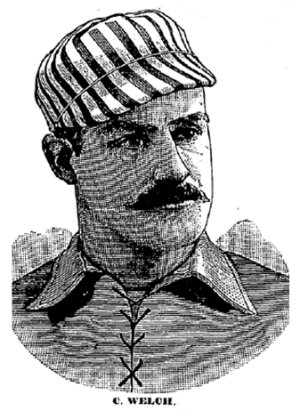
Welch came back and smacked a single to right field. Dave Foutz reached on an error. After a sacrifice bunt by Yank Robinson, runners stood at second and third with one out. “As Bushong walked up to the plate [Mike] Kelly very comically got down on his knees and reverentially handed ‘Bush’ his bat. Bushong’s services, however, were not brought into requisition. The second ball rolled back to the grand stand, and Welch trotted home with the World’s Championship run. The ball which let in Welch was really a wild pitch, although it hit Kelly’s hands. Kelly had signaled for a low ball, but [John] Clarkson sent in an ugly up-shoot, and Kelly was not prepared for it.†8
St. Louis had won the game, 4 to 3, in 10 innings—and the World Series. According to the Chicago Tribune : “[After the win] the excitement was absolutely uncontrollable among the people, who carried the Browns bodily off the field in triumph. The crowd was packed in thousands around the Browns’ dressing-rooms, and the grandstand shook and trembled like a leaf. Fifteen minutes after the game the cheering and excitement had not subsided.†9 The Sporting News reported the total receipts for the six games were $13,920.10 (half going to the players, half to Von der Ahe to pay expenses), which each Brown collecting $580. 10
*Â Â Â Â Â Â Â Â Â *Â Â Â Â Â Â Â Â Â Â *Â Â Â Â Â Â Â Â Â Â *Â Â Â Â Â Â Â Â Â *Â Â Â Â Â Â Â Â Â Â *Â Â Â Â Â Â Â Â Â Â *
After the series, various players (and owner) were quoted in the Sporting News :
Abner Dalrymple — “Good-bye boodle, good-bye.”
George Gore — “Dal did not see that ball Latham knocked. He was asleep at that time and dreaming about the boodle.”
Jimmy Ryan — “If that ball had come to me instead of to Dal I’d of chewed the hide off it.”
Albert Spalding — “Dal ought to have caught that ball.”
Mike Kelly — “I don’t know about his catching it.”
An unknown White Stocking player — “Ryan or Gore would have smothered it.”
Almost all the White Stockings seemed to think Dalrymple should have caught the ball, and it was reported “in fact every one of the Chicagoans blamed Dalrymple for the defeat they had sustained that day.†11
However in the Chicago Tribune the day after the game Albert Spalding said: “the unfortunate condition in which his pitchers are is the cause of the club’s defeat. They played their usual game today, while the Browns had all the luck.†12
*Â Â Â Â Â Â Â Â Â Â * Â Â Â Â Â Â *Â Â Â Â Â Â Â Â Â Â *Â Â Â Â Â Â Â Â Â Â *Â Â Â Â Â Â Â Â Â Â *Â Â Â Â Â Â Â Â Â Â *
The 1911 edition of Alfred H. Spink’s “ The National Game ” gave this account of the Dalrymple play:
It was Latham’s quick wit and resourcefulness that won an important World’s Championship game for St. Louis one day from Chicago.
With Welch on third and Gleason on second Latham came to the bat. A hit meant the game for St. Louis and Latham knew it.
“Play a little farther out Mr. Dalrymple,” said Latham to the Chicago’s left fielder. “I am going to make a long hit to left and if you don’t play a little farther out it will get away from you and go sailing over your head.”
Quite naturally following the old rule, Dalrymple believing that Latham was going to do the very opposite of what he boasted he would do, came in from the field, stationed himself right back of the Chicago short fielder and then shouted to Latham that he knew his game.
Latham hit the next ball with all his might and it sailed to left field. Dalrymple would have captured the ball had he been playing deep as Latham had advised him to do. But instead it sailed over Dal’s head and the game was won for St. Louis. 13
Of course this could fall into the category of legend, as we know the ball hit over Dalyrmple’s head occurred in the 8th inning and only tied the game. Also, Welch and Bushong (not Gleason) were on base and scored on Latham’s hit. With all the bantering going on between players, something like this talk might have happened. But the special report to the Chicago Tribune the day after the game only told of Latham shouting to Bushong and Welch: “Move up now, and I’ll bring you in.†The Tribune report only stated the runs scored on Latham’s “three bagger to the left field fence,†not mentioning any misplay by Dalrymple. The Sporting Life’s report of the game stated of the play: “He [Welch] stole third, Bushong got to first on balls and both scored on Latham’s three-base hit, tying the score amid the greatest excitement.†One source, the Denver Daily News , did report that Latham “knocked a long fly to left field, which according to all accounts, Dalrymple misjudged in a style that would have disgraced an amateur.†14
*Â Â Â Â Â Â Â Â Â Â *Â Â Â Â Â Â Â Â Â Â *Â Â Â Â Â Â Â Â Â Â * Â Â Â Â Â Â *Â Â Â Â Â Â Â Â Â Â * Â Â Â Â Â Â *
As to the 1898 report that Cap Anson told Dalrymple as they left the field: “You can’t play ball for me any more, Dal,†I did not see anything like this in the Sporting News , Sporting Life , or Chicago Tribune coverage. In his book, A Ball Player’s Career: Being the Personal Experiences and Reminiscences of Adrian C. Anson , the White Stocking’s manager said of Dalrymple: “He was only an ordinary fielder, and a fair base runner, but excelled as a batsman. I have said that he was a fair fielder, and in that respect I am rating him too high, as his poor fielding cost us several games that in my estimation we should have won.†Anson, of course, did not specify this championship game.
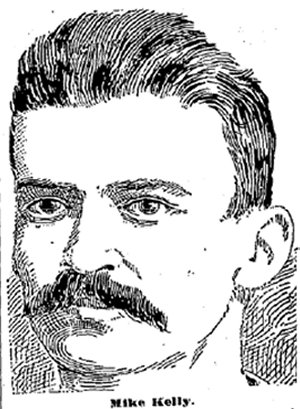
Regarding this series, he simply stated: “We were beaten, and fairly beaten, but had some of the players taken as good care of themselves prior to these games as they were in the habit of doing when the League season was in full swim, I am inclined to believe that there might have been a different tale to tell.†15
However, as seen from the above comments in the Sporting News , it was apparent shortly after the game Dalrymple was being made the scapegoat for the loss. It was being reported “the feeling against Dalrymple is growing more bitter with time. The boys without an exception, lay the blame for losing the last Chicago-St. Louis game on him, and have talked about it so freely ‘Dal’ has heard their remarks and feels so blue over them that he threatens never to play ball again.†16 Mike Kelly was quoted as saying to a Chicago reporter: “I am heartily sick and tired of being made the victim of such monkey business as is tolerated in base ball, and the monkey business which lost me $500 as my share of the receipts of the world’s championship series has completely broken my back. Do you wonder at it? For six games I stood up behind the bat and suffered myself to be pounded into a jelly without making an error; I played the best I could for I wanted my share of the stakes. At the very critical moment of the sixth game an unexcusable piece of ‘monkeying’ on the part of a fielder who had done one per cent as much work as I had, deprived me of the reward which my patient labor had fairly gained.†These comments caused the Sporting Life reporter to comment: “The force of Mr. Kelly’s remarks will be best appreciated when it is remembered that neither Kelly or any other Chicago except poor Dalrymple ever misjudged a fly or struck out. It’s a cold day when somebody can’t be found to bear the burden of blame.†17
In November 1886 the Sporting Life reported the players who had signed contracts with Chicago for the 1887 season, and a sentence following these names stated “Dalrymple has not yet signed for 1887.†18 The next issue of the Philadelphia weekly reported “Dal is still here [Chicago] awaiting Al’s return so that he may talk business for the coming year.†[Spalding and Anson were “popping away at duck and prairie chickens in far distant Dakota†the Chicago correspondent informed his readers.] 19 It is possible Dalrymple was waiting for the Chicago management in order to obtain his release. It was later reported by the Sporting Life that Dalrymple was upset about his being replaced by Jimmy Ryan after his hitting fell off; then his being blamed by his fellow players for the game six loss. The paper reported “since then he has tried by every means in his power to induce Mr. Spalding to release him, even offering a cash consideration for the same.†20 The Sporting News was also to report that Dalrymple was seeking his release, saying “that he seemed to have come to a standstill in his play, and that if he went to another club he hoped to get back his old time strength.†21
Around this time the Pittsburgh Commercial reported it was probable Pittsburgh would go into the National League, and that Chicago would give Dalrymple to Pittsburgh. 22 Within a week Pittsburgh was admitted to the National League. Dalrymple was released by Chicago to Pittsburgh on November 26 “for a moneyed consideration,†23 reportedly $2,000. 24 Albert Spalding was reported as having “a good deal of hesitancy about giving up Dalrymple, but the latter felt that a change would be beneficial and his wish to withdraw was granted.†25 However, it must be noted that after the White Stockings sold Dalrymple, two other stars were sold. George Gore’s release was sold to the New York club for $3,500, and Mike Kelly’s was sold to Boston for $10,000. 26
*Â Â Â Â Â Â Â Â Â Â *Â Â Â Â Â Â Â Â Â Â *Â Â Â Â Â Â Â Â Â Â *Â Â Â Â Â Â Â Â Â Â *Â Â Â Â Â Â Â Â Â Â *Â Â Â Â Â Â Â Â Â Â *
Now to the 1898 statement “Dalrymple’s base ball degeneration dated from that day” (October 23, 1886). This is not accurate, as he already had slumped both in 1885 and 1886—prior to the championship series with St. Louis.
Dalrymple was a first class hitter his first seven years in the league, hitting:
| 1878 | Milwaukee | .354 in 61 games |
| 1879 | Chicago | .291 in 71 games |
| 1880 | Chicago | .330 in 86 games |
| 1881 | Chicago | .323 in 82 games |
| 1882 | Chicago | .295 in 84 games |
| 1883 | Chicago | .298 in 80 games |
| 1884 | Chicago | .309 in 111 games |
Then in 1885 Abner slumped to .274 in 113 games. In 1886 he hit only .233 in 82 games, being replaced by Jimmy Ryan in left field. After 1886 he continued to drop, hitting .212 in 1887 and .220 in 1888, both years with Pittsburgh. His last season with a major league club was back in Milwaukee for 32 games at the end of the season with the Brewers in the American Association, hitting .311. 27
Already in 1886 it was seen Dalrymple (and the Chicago team) was past his prime. The Sporting News of October 30, 1886, commented: “As another evidence that the Chicagos are not the team they were a few years ago it may be well to call attention to the fact that in 1878 Dalrymple led the League in batting. In the recent series, however, that gentleman did nothing but fan out and he could not even play a fair game in the field. His comrades, in fact, attribute their defeat to his poor fielding.” It further reported “Dalrymple is troubled with an affection of the eyes and cannot see as well as of old.†28
*Â Â Â Â Â Â Â Â Â Â *Â Â Â Â Â Â Â Â Â Â *Â Â Â Â Â Â Â Â Â Â *Â Â Â Â Â Â Â Â Â Â *Â Â Â Â Â Â Â Â Â Â *Â Â Â Â Â Â Â Â Â Â *
How did Abner Dalrymple do overall in the 1886 Championship Series? Here are his offensive stats from the Sporting News .
At Bats 21 Runs 2 Hits 4 Total Bases 7
In the field Dalrymple had 9 chances and made 3 errors (By the way, he was not given an error for the ball Latham hit over his head). He had 4 putouts and 2 assists in the six games. 29
*Â Â Â Â Â Â Â Â Â Â *Â Â Â Â Â Â Â Â Â Â * Â Â Â Â Â Â *Â Â Â Â Â Â Â Â Â Â *Â Â Â Â Â Â Â Â Â Â *Â Â Â Â Â Â Â Â Â Â *
Was Abner Dalrymple unfairly blamed by the owner, his manager and teammates for the loss of the championship in 1886? Let’s go back to 1886, for some contemporary answers.
On November 3, 1886, the Sporting Life wrote of the mounting comments that Dalrymple’s misjudging of the fly ball, and his striking out in the 9th inning with a runner on third, cost Chicago the game and the series:
However true this may be, it forms but a slim basis for an issue so far as the loss of the contest is concerned. Chicago had no business to permit the battle to become so close that its result would hinge upon the work of a single player in any particular game. While the series was being arranged they laughed at the idea of the Browns assuming to cope with them in a struggle for the world’s championship, and would not listen to anything less than six straight victories….Yet we find, through an analysis of the work of the two teams, that the White Stockings were out-batted, out-fielded, out-generaled and practically snowed under in every point of play from beginning to end of the series. 30
The Sporting News of November 20, 1886, laid the blame elsewhere, as it wrote:
A question of national importance has just arised. Half of the base ball world are claiming that Dalrymple lost the world’s championship for Chicago, while the other half do not appear to care whether he was responsible for the loss of it or not. Now, as a matter of fact, Dalrymple did not lose the championship for Chicago. The hit which Latham made was scored in the eighth inning, and it seems to be an open question as to whether Dalrymple misjudged it or not. It did not win the game for Chicago [correctly St. Louis], however. It simply tied the score. The game, according to the real facts, was lost in the tenth inning. The Chicagos, it will be remembered, were blanked in their half. For St. Louis, Welch, after getting in the way of the ball and being hit by it, was given first by the umpire, but the decision was changed on a vigorous kick by Chicago. Welch, however, lined the ball past second for a base hit, and victory was scented in the air. Foutz hit a difficult grounder, which Williamson failed to handle, the error being excusable. Then Robinson purposely bunted the ball in order to make a sacrifice, and was thrown out by Burns. There was now one out and runners on second and third. Only one run was wanted to win the game. As Bushong walked up to the plate Kelly very comically got down on his knees and reverentially handed that individual his bat. Kelly saw that the critical point had been reached.
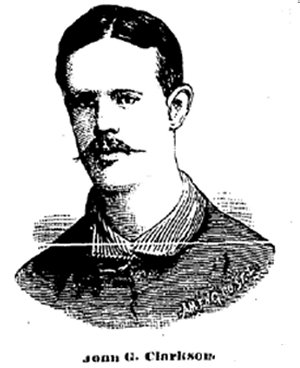
He got clean down in the dirt, as it were, and signaled to Clarkson to send in a very low ball. At such a stage Kelly’s action was most foolish and hazardous. Had he assumed a regular position he could have stopped almost any ball sent in. As it was, however, he got way down low and when Clarkson pitched a ball no higher than Bushong’s shoulder, Kelly, instead of stopping it, just tipped it with the tips of his fingers. As the ball shot by him, Welch trotted home with the run which decided the World’s Series. The run which decided the game was scored wholly through the poor judgment of Kelly. We make this statement simply that justice be done Dalrymple, and that the credit for the loss of the series should be placed where it is due. 31
*Â Â Â Â Â Â Â Â Â Â *Â Â Â Â Â Â Â Â Â Â *Â Â Â Â Â Â Â Â Â Â *Â Â Â Â Â Â Â Â Â Â *Â Â Â Â Â Â Â Â Â Â *Â Â Â Â Â Â Â Â Â Â *
Perhaps we should remember the 1886 World Championship Series as one of the great ones. In the end the Sporting News issue of October 30, 1886, summed it up best: “The Chicagos made a grand fight and they only fell after ten innings had been played. Finer work on the field we never saw than on that day. Perhaps the world never saw. From the opening call until the end every man did his best. If the Chicagos were beaten it was because they were not so good as St. Louis.†32
*Â Â Â Â Â Â Â Â Â Â *Â Â Â Â Â Â Â Â Â Â *Â Â Â Â Â Â Â Â Â Â *Â Â Â Â Â Â Â Â Â Â *Â Â Â Â Â Â Â Â Â Â *Â Â Â Â Â Â Â Â Â Â *
This article attempts to zero in on the game of October 23, 1886, and its consequences for Abner Dalrymple. For the best description of the entire 1886 series, I suggest Jerry Lansche’s, Glory Fades Away: The Nineteenth Century World Series Rediscovered , published in 1990 by Taylor Publishing Company.
Endnotes
1. Sporting News
December 31, 1898
2. Sporting News
October 4, 1886
3. Sporting News
October 25, 1886
4. Sporting News
October 30, 1886
5. Milwaukee Sentinel
October 24, 1886; Chicago Tribune
October 24, 1886
6. Chicago Tribune
October 24, 1886
7. Chicago Tribune
October 24, 1886
8. Sporting News
October 30, 1886
9. Chicago Tribune
October 24, 1886
10. Sporting News
October 30, 1886
11. Sporting News
October 30, 1886
12. Chicago Tribune
October 24, 1886
13. Alfred H. Spink, The National Game
, 1911 edition, pages 214 – 216
14. Chicago Tribune
October 24, 1886; Sporting Life
October 27, 1886;
Denver Daily News
November 2, 1886
15. Adrian C. Anson, A Ball Player’s Career: Being the Personal Experiences and Reminiscences of Adrian C. Anson
, Era Publishing, Chicago, 1900, pages 114 and 137
16. Sporting News
November 20, 1886
17. Sporting Life
November 10, 1886
18. Sporting Life
November 3, 1886
19. Sporting Life
November 10, 1886
20. Sporting Life
December 1, 1886
21. Sporting News
December 18, 1886
22. Sporting News
November 13, 1886
23. Sporting News
November 27, 1886; Sporting Life November 24, December 1, 1886
24. Sporting News
February 19, 1887
25. Sporting Life
December 1, 1886
26. Sporting News
February 19, 1887
27. Statistics from baseball-reference.com
28. Sporting News
October 30, 1886
29. Sporting News
October 30, 1886
30. Sporting Life
November 3, 1886
31. Sporting News
November 20, 1886
32. Sporting News
October 30, 1886


Great research, Dennis!